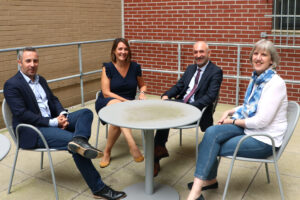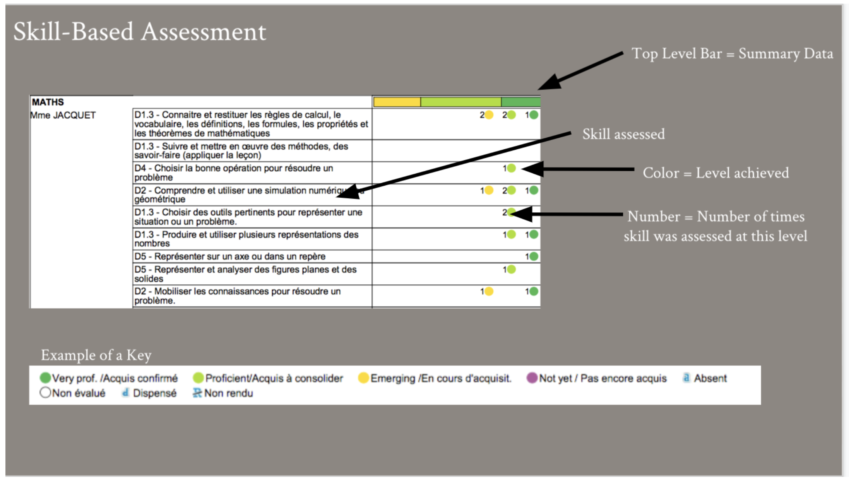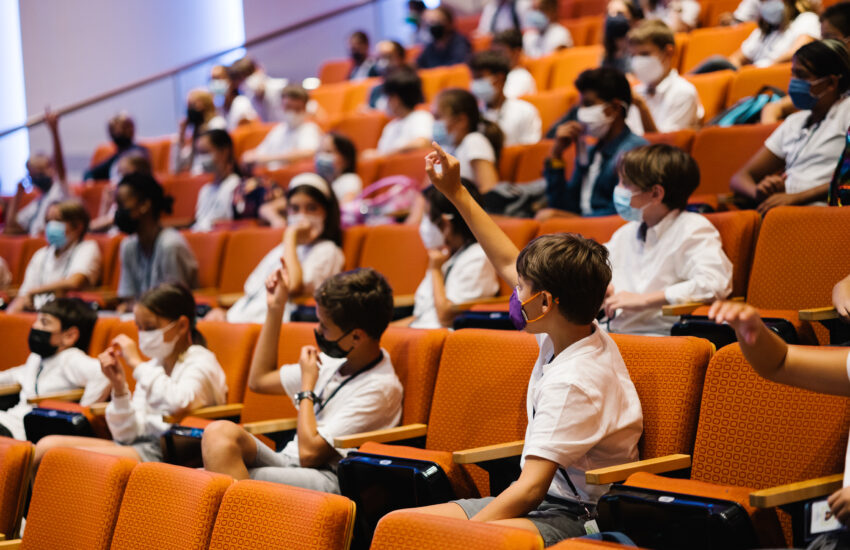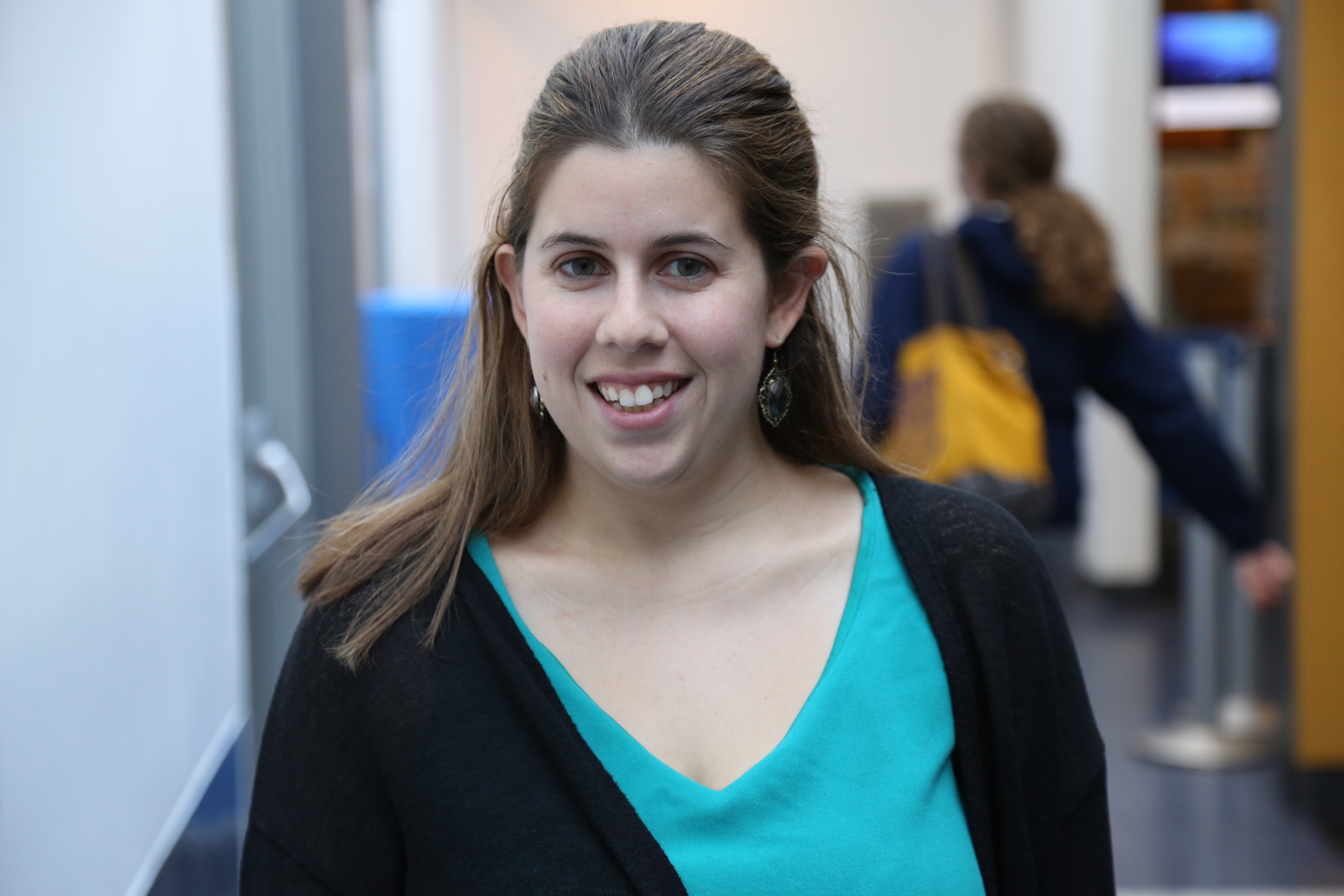Starting with this year’s sixth graders, the Middle School of the Lycée Français de New York is gradually adapting a skills-based assessment model in place of traditional grades. Inspired from the French system, four teachers share insight on why the school is taking this approach.
Middle School teachers often report this scenario: a student writes a paper, takes a math test, or completes a project. Their teacher grades the work and hands it back. The student looks at the grade on the front, reacts with either delight or dismay, and continues with their day. Most of the time, they will not give the paper a second look or even turn to the second page. And the teacher’s feedback goes unread.
This observation, which is made year after year, prompted us to ask two fundamental educational questions:
- How do we best measure a student’s abilities at a given time, or over time?
- And how do we communicate this information to the student in a way that is meaningful, motivating, and appropriate for their development?
We know that the brain of a young adolescent is both impulsive and rewards seeking. When a student is provided with two sets of information–one a numeric value or grade, and the other a detailed set of written feedback–the adolescent brain will look to the easiest information to interpret. Work that is graded and returned becomes an end in itself, rather than an opportunity for learning and improvement.
Improving our focus on learning
In 2018, Secondary English teacher Elizabeth Hollow received a summer research grant from the Lycée exploring the impact of grades on student learning in sixth grade. She examined practices across the Primary and Secondary Schools to propose a reconsideration of the way we approach student assessment. Her research, along with research conducted by her Middle School colleagues, confirmed what many schools in France and the U.S. have found: accurately assessing student learning is a complex process. To be effective, it requires a more authentic and specific approach to how we discuss progress.
One way in which this can be done better is by focusing on skill acquisition and development. This shift aims to clearly articulate the objective of each classroom subject, providing a clear roadmap for students and parents to focus on growth. Ultimately, these changes better support the transition from Primary to Secondary, and improve our focus on learning.

We asked four teachers in the Secondary who bring practical and research experience what it means for the Lycée’s collégiens.
- Mathieu Cladidier, French teacher and Department Coordinator
- Elizabeth Hollow, English teacher
- Jennifer Jacquet, math teacher
- Emmanuel Lavalette, science teacher
What is skills-based assessment, and how does it fit in with the overall pedagogical approach in the Lycée’s Middle School?
Elizabeth Hollow: Skills-based assessment is a method of measuring and communicating student progress toward a specific set of skills that is deemed essential in a subject area. Rather than relying on a single numerical grade or an average to summarize student learning, teachers using skills-based assessment gather and record information over time and through a variety of tasks. This helps them determine which skills and content knowledge a child has effectively mastered and which still need to be improved. Each task or project assigned to students is clearly linked to the skills being assessed; and students receive consistent feedback throughout the learning process, which clarifies exactly what is expected of them and how to move forward.
This method dovetails well with the Lycée’s larger pedagogical approach in the Middle School, which aims not only to provide a smooth academic transition between Primary and Secondary levels, but also to provide an educational experience that is authentic, exploratory and developmentally appropriate for early adolescence.
Is it something new for schools? What experience in other schools can we learn from?
Mathieu Cladidier: Skills and competency-based evaluation is not a new concept, having been part of French pedagogical practices since legal reforms in 2005. I gained personal experience with this method while working at the École Bilingue de Berkeley, California., between 2012 and 2016. There, we decided to implement this system to reduce our students’ stress about grades, while simultaneously enhancing learning. This experience made it clear to me that this practice allows for student learning and growth, and not just a continuous cycle of assessment. Rather, it is a true complement to both learning and individual learners. It allows students to better understand expectations and strategies for progress, because it offers greater curriculum transparency for students, teachers and families.
How has the Lycée been preparing for this change?
EH: Starting in September 2020, Adena Dershowitz, our head of Middle School, and four sixth-grade teachers from the science, math, English and French departments have met at least once a cycle, with the aim of exploring best practices for skills-based assessment and developing a plan to integrate this model in sixth grade starting in 2021.
As part of this, we have attended multiple training sessions with an expert consultant from Marzano Research, an educational leader in skills-based teaching and assessment. We have also worked closely with the sixth-grade teaching team and heads of departments, who helped us identify the most essential skills or standards for each subject, and to design detailed proficiency scales to help communicate those standards to students and their families.
How do we maintain academic rigor in a skills-based approach to student assessment?
MC: Academic rigor is maintained by virtue of course content and the curriculum remaining the same. Indeed, skills-based evaluation allows students to fully understand what is expected of them, and thereby be more involved in the learning process. Academic standards are not only maintained, but made more accessible to learners.
Emmanuel Lavallette: Additionally, the official French exams (the Brevet and the Baccalauréat) are designed based on student ability to comprehend and apply concepts they learn as part of the official subjects. Implementing a skills-based approach to evaluation as early as sixth grade helps students better prepare for these exams.
How is student work, including homework, tests and papers, graded in this model?
Jennifer Jacquet: In a classroom where evaluation is based on skill, learning is no longer linear. It becomes part of ongoing acquisition of knowledge and abilities throughout the year, and removes the standard routine of being assessed, graded, and then moving on to the next concept. Students have the opportunity to work on skills that are not acquired or mastered again at the time, or can acquire and reinforce it later in the year or in their educational journey.
To implement this method of evaluation, all teachers have established a subject-specific framework detailing the key concepts students should acquire. These concepts and the relevant measures of competence are based on the official curriculum, as well as from the socle commun of knowledge and skills for Cycle 3 (CM1,CM2 and 6ème, fourth, fifth and sixth grade).
 During each course sequence, the requisite skills are outlined for students and families. They can be featured on classroom material, or presented at the beginning of a chapter. Thus, students can link what is taking place in the classroom to the skills they are working on. Each assignment, evaluation, or piece of homework assigned to students is discussed in advance, and students will know what skills it focuses on. An evaluation system featuring four levels of skill proficiency is implemented, and an acquisition level – not acquired, in progress, on track, acquired – will be noted on student work, allowing them to know exactly where their comprehension of the materials stands.
During each course sequence, the requisite skills are outlined for students and families. They can be featured on classroom material, or presented at the beginning of a chapter. Thus, students can link what is taking place in the classroom to the skills they are working on. Each assignment, evaluation, or piece of homework assigned to students is discussed in advance, and students will know what skills it focuses on. An evaluation system featuring four levels of skill proficiency is implemented, and an acquisition level – not acquired, in progress, on track, acquired – will be noted on student work, allowing them to know exactly where their comprehension of the materials stands.
What grades at the Lycée will be moving to skills-based assessment, and how do you plan to phase it in over time?
EL: With Rentrée 2021-22, we debuted a model of skills-based assessment for sixth grade. We began preparing these students for this model when they were in CM2, so have been working with them for over a year. Our strategy is to use the work being done with this grade, and the resources we create, to progressively roll out this system throughout the Middle School, with support from each department’s pedagogical teams. Thus, it will be implemented in seventh grade starting in the 2022-23 school year, and eighth grade starting in 2023-24.
About the Author :
Originally from Scranton, Pennsylvania, Adena Dershowitz is Head of Middle School. She began working at the Lycée as the secondary technology integrator in early 2012 and became Director of Digital Learning in 2014 and then Director of Curriculum Development in 2018. Adena earned a master’s degree in education and technology from the Harvard Graduate School of Education, and a bachelor’s degree from the University of Maryland. Prior to her work at the Lycée, she worked to infuse technology into informal (afterschool and camp) education. In her spare time, she likes to travel, experience the outdoors and make things.


